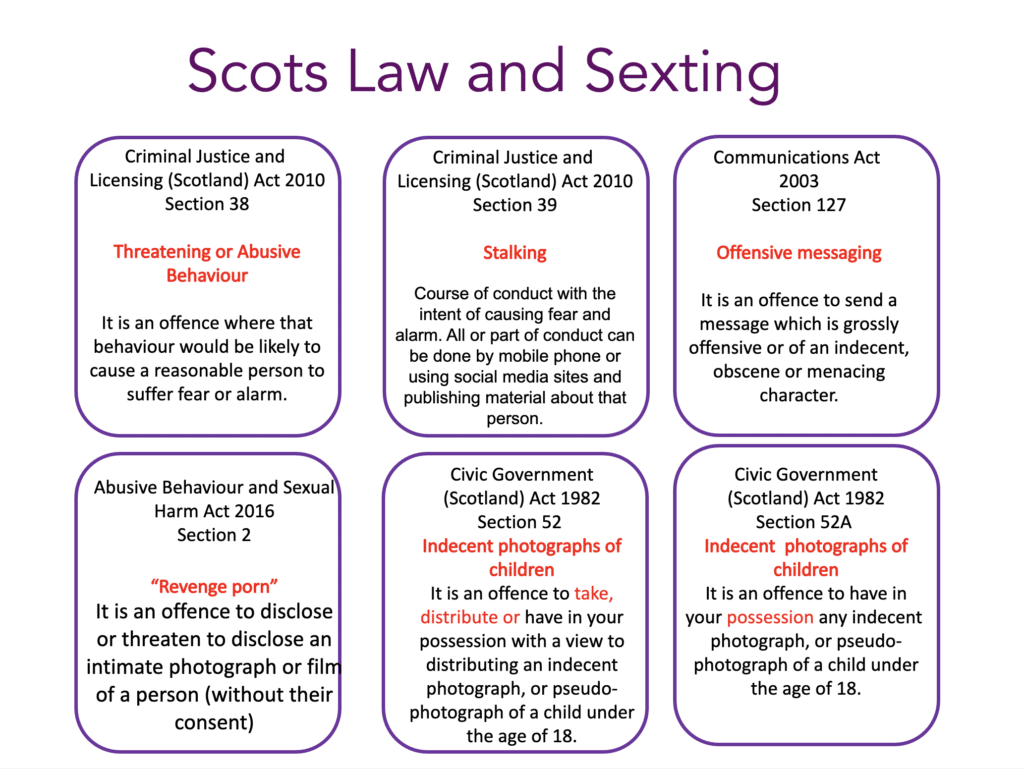Sexting under the law of Scotland


“Sexting” is not a legal term. Sexting is “self-produced sexually explicit material” carried out mainly via smartphones. At present, “sexting” behaviour of various kinds in Scotland could be prosecuted under one of many statutes and is a complex issue. The statute sections above are the main ones likely to be used by prosecutors. Whatever we call it, ‘sexting’ is a mainstream activity amongst children and adults alike. Just because a child consents to making or sending an image, does not make it legal. Cyber-enabled crime is one of the fastest growing sectors of crime today.
The offence of stalking is the entering into a course of conduct with the intent of causing fear and alarm. All or part of that course of conduct can be by mobile phone or using social media sites and publishing material about that person.It is becoming increasingly common amongst children. It does not refer only to stalking in person.
Our CEO, Mary Sharpe, is a Member of the Faculty of Advocates and of the College of Justice. She has experience of criminal law on both the prosecution and defence sides. Mary Sharpe is currently on the non-practising list while she is involved with the charity. She is happy to speak to parents, schools and other organisations in general about the practical implications of a brush with the law around pornography-related sexual offending. She will not be able to provide legal advice for specific cases.
Criminal law in Scotland is different from the law in England and Wales and Northern Ireland. See this article about the situation there along with our page on it. Law officers treat complaints of what academics and journalists call “sexting” like any other potential crime. They do this on an individual basis. Children under 16 will generally be referred to the Children’s Hearing System. In the event of serious offences such as rape, children under 16 years can be dealt with through the criminal justice system in the High Court of Justiciary.
If convicted of a sexual offence, the range of sentences are wide. They will include notification on the Sex Offenders Register for those 16 years and over processed through the criminal courts.
For children under 16, sexual offending will be treated as an “conviction” for the purposes of the Rehabilitation of Offenders Act 1974 though not called such in the Children’s Hearing System. Under the new Disclosure (Scotland) Act 2020, young people will generally not be required to disclose such offences when applying for a job unless they want to work with vulnerable groups including children. In that case sexual offences may be mentioned in a disclosure certificate. Parents should seek legal advice about these new provisions.
The practical impact of a sexual offence on employment, social life and travel for someone under, and over 16, are significant and little understood. Here is a case from 2021 when the appeal by a young Edinburgh law student to have his name removed from the children’s list for sexual offences when he was a young teenager was refused.
From the case report: “The pursuer was convicted of three offences under the Sexual Offences (Scotland) Act 2009 in October 2018. The offences were broadly similar in detail, involving the pursuer placing his hands on the complainers’ breasts, legs, and genitals over their clothing, and were committed against three teenage female complainers. At the time of the offences, the complainers were aged between 13 and 16 and the pursuer was aged between 14 and 16. The offences occurred in public places and were described as involving elements of “power, control, and manipulative behaviour”. “
Although this case did not involve a sexting offence, the same concerns about power, control and manipulation can apply in cases of coercive sexting too.
In general, childhood convictions, including matters dealt with through the Children’s hearing System, will no longer be automatically disclosed to prospective employers and will be eligible for independent review through the Sheriff Court. This latter procedure will most likely be at the young person’s own expense.
As cyberbullying and sexual harassment become more prevalent, prosecution authorities are taking a more proactive approach. Teachers, parents and children need to inform themselves of the risks. Pals who share indecent images they have received from others can be prosecuted too.
The Reward Foundation has developed lesson plans for schools about the law in this area. If you are interested, please contact our CEO at [email protected] for more information.
This is a general guide to the law and does not constitute legal advice.

